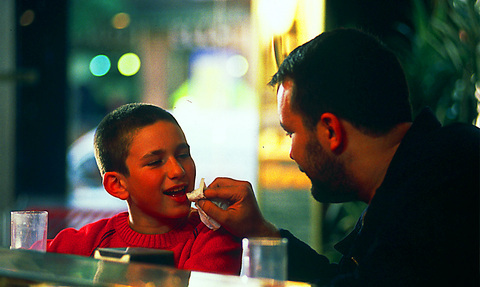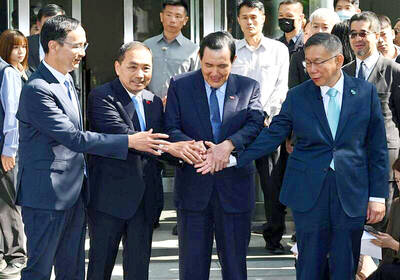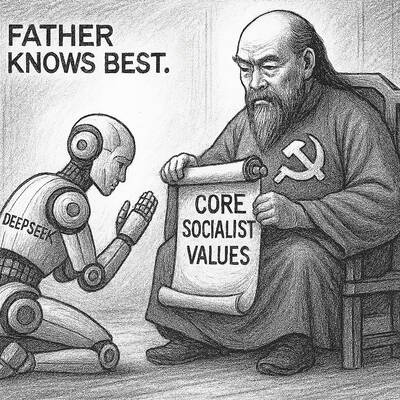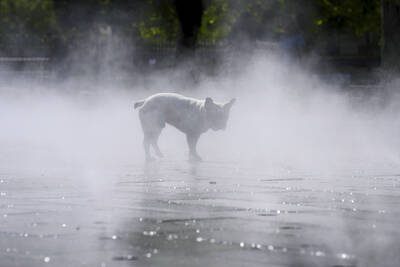What happens when a sexually free-spirited, HIV-positive dentist becomes the unofficial custodian of his 9-year-old nephew? That's the question posed by Bear Cub, a wise, sweet-natured Spanish film, in which an uncle, Pedro (Jose Luis Garcia-Perez), takes in his smart, very hip young nephew Bernardo (David Castillo) after Bernardo's mother is detained abroad.
Pedro is a denizen of Madrid's "bear" subculture of proudly paunchy gay men who don't shave their bodies and who refuse to cultivate the chiseled Calvin Klein ideal of eternal boyishness.
Bernardo is precociously attuned to the lifestyles of urban sophisticates. His widowed mother (and Pedro's older sister), Violeta (Elvira Lindo), is a high-strung, superannuated hippie who leaves Bernardo with his uncle when she impulsively decides to take a two-week jaunt to India with her latest boyfriend. When Violeta is arrested at the border for drug trafficking and held in jail indefinitely, Pedro's babysitting duties become temporary guardianship.

PHOTO COURTESY OF TLA RELEASING.
If Bear Cub were an American movie or television play, you can bet it would be puritanically wringing its hands over Pedro's supposed inappropriateness as a guardian and role model, not to mention the possible health risks Bernardo faces living with an HIV-infected relative. It would probably involve a fierce court battle, a death scene and a final, tearful reunion between the son and his morally chastened mother.
But Bear Cub calmly defies expectations at every turn. It opens with a fairly graphic gay threesome. It goes out of its way to portray HIV infection as something other than a death sentence. It also explores Pedro's relationship with a flight attendant and part-time lover who wants a full-time commitment that Pedro is unwilling to make. It even follows Pedro to a gay bathhouse.
The movie brings in a potential villain in Violeta's widowed, estranged mother-in-law, Dona Teresa (Empar Ferrer), a lonely old woman who blames Violeta for her son's drug-related death. Eager to re-establish a family connection, Dona Teresa wants to take over Bernardo's upbringing and send him to a good school. But Pedro and his nephew have formed a strong attachment, and the boy is reluctant to leave his uncle. A legal battle ensues, but there is no high drama.
The film, directed by Miguel Albaladejo, who wrote the screenplay with Salvador Garcia, refuses to demonize the grandmother, even though she is ruthless enough to have Pedro followed and to obtain his medical records to bolster her cause.
In his casual but deeply caring way, Pedro is a responsible guardian. When he sternly scolds a friend for rolling a joint in front of Bernardo, the boy chimes in and admits that he has rolled many joints for his mother.
Without the endearing, canny performance of Castillo, whose Bernardo is still a child beneath his wised-up shell, Bear Cub might have been an uncomfortably gooey uncle-and-moppet odd-couple comedy.
And at the end, Bear Cub does have a brush with sentimentality. But by then, its integrity and low-key truthfulness has been certified in a dozen different ways.

Has the Taiwan People’s Party (TPP) changed under the leadership of Huang Kuo-chang (黃國昌)? In tone and messaging, it obviously has, but this is largely driven by events over the past year. How much is surface noise, and how much is substance? How differently party founder Ko Wen-je (柯文哲) would have handled these events is impossible to determine because the biggest event was Ko’s own arrest on multiple corruption charges and being jailed incommunicado. To understand the similarities and differences that may be evolving in the Huang era, we must first understand Ko’s TPP. ELECTORAL STRATEGY The party’s strategy under Ko was

It’s Aug. 8, Father’s Day in Taiwan. I asked a Chinese chatbot a simple question: “How is Father’s Day celebrated in Taiwan and China?” The answer was as ideological as it was unexpected. The AI said Taiwan is “a region” (地區) and “a province of China” (中國的省份). It then adopted the collective pronoun “we” to praise the holiday in the voice of the “Chinese government,” saying Father’s Day aligns with “core socialist values” of the “Chinese nation.” The chatbot was DeepSeek, the fastest growing app ever to reach 100 million users (in seven days!) and one of the world’s most advanced and

It turns out many Americans aren’t great at identifying which personal decisions contribute most to climate change. A study recently published by the National Academy of Sciences found that when asked to rank actions, such as swapping a car that uses gasoline for an electric one, carpooling or reducing food waste, participants weren’t very accurate when assessing how much those actions contributed to climate change, which is caused mostly by the release of greenhouse gases that happen when fuels like gasoline, oil and coal are burned. “People over-assign impact to actually pretty low-impact actions such as recycling, and underestimate the actual carbon

An internal Meta Platforms document detailing policies on chatbot behavior has permitted the company’s artificial intelligence creations to “engage a child in conversations that are romantic or sensual,” generate false medical information and help users argue that Black people are “dumber than white people.” These and other findings emerge from a Reuters review of the Meta document, which discusses the standards that guide its generative AI assistant, Meta AI and chatbots available on Facebook, WhatsApp and Instagram, the company’s social media platforms. Meta confirmed the document’s authenticity, but said that after receiving questions earlier this month, the company removed portions which stated